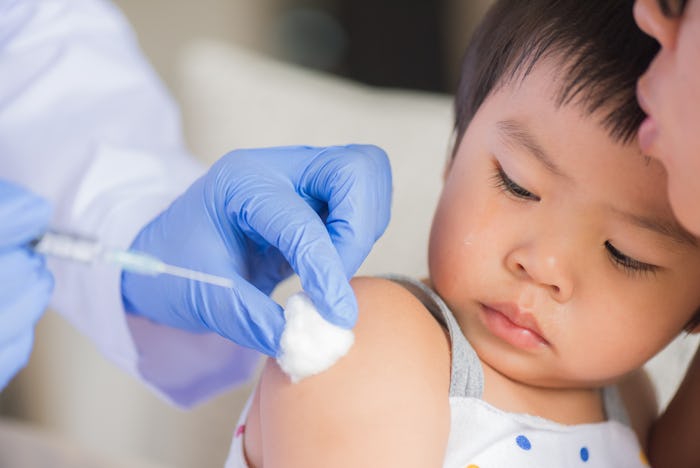Life

When, Oh When Will Flu Season End? Not Yet, Unfortunately
Being pregnant or a new parent during the height of flu season can be genuinely stressful. So right about now, parents everywhere are wondering: When will flu season end? Fortunately, the flu timeline is pretty cyclical, with only minor shifts from year to year. Still, don't expect to find an exact prediction.
"Flu season generally begins around October-November, and ends about March-April," Kecia Gaither M.D. tells Romper. This year feels different because the B virus of the flu (the strain normally expected to be seen late in the flu season) has been the predominant flu virus according to the Centers for Disease Control and Prevention (CDC). An equal number of the A strain (H1N1pdm09) and the B strain of the virus (Victoria) have been reported in recent weeks. As Time explained, "a vaccine mismatch and reduced immunity to influenza B may have contributed to the early and severe start of this flu season."
This time of year, many of us would prefer to use our doctor's office teleservices or the nursing line of our insurance office to avoid a doctor's visit, but Dr. Gaither warns that with the flu, this might not be the best idea. "Remote medicine can help to identify those at highest risk that need to be evaluated in the hospital," she says, but "diagnosis and treatment of the flu requires a hospital visit — if not admission — depending on the symptoms."
So when will flu season end this year, if the later virus is already prevalent in January? Unfortunately, we just don't know. As The New York Times reported, the flu is wily and unpredictable, and while some data shows that the flu peaked just before Christmas, we're not out of the woods yet. Further spikes in activity are possible. However, some good news is that hospitalizations and deaths linked to the virus are actually down from last year.
The CDC strongly suggests that those ages 6 months and up who haven't received the flu vaccine should still get one, because even if it doesn't offer 100% protection from the virus, it may work to attenuate the virus in those who do eventually contract the flu.
The flu is dangerous and potentially deadly, so it's best that everyone who can get the flu vaccine does get the flu vaccine. You're not just protecting yourself, you're protecting those around you... including babies and children too young or immunocompromised to be vaccinated.
Experts:
Kecia Gaither, M.D., MPH, FACOG, double board-certified in OB/GYN and Maternal Fetal Medicine, Director of Perinatal Services at NYC Health and Hospitals
This article was originally published on